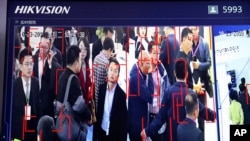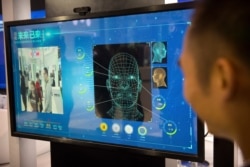Starting this month, China has made it mandatory that new mobile phone users will have to have their faces scanned before completing their real-name registration with telecom operators.
But the latest policy has worried many netizens and rights defenders, some of whom complained that China is moving one step closer to tighten its cyberspace controls and bring to life the world British writer George Orwell imagined in his book 1984.
Observers say, until legal regulations and safeguards are in place to protect consumers’ rights to privacy, the aggressive move will no doubt lead to the Communist state’s abuse as a political tool to track dissidents or privacy risks as a result of consumers’ biometric data being leaked or re-sold.
The Big Brother
On Weibo, the Twitter-like microblogging site in China, one user wrote “the Big brother is keeping an eye on you – George Orwell’s 1984,” and another described it as “the eye of the hell” while the majority of online comments under an article about the new policy also spoke negatively about it.
The collection of citizens’ facial scans will play an important part to widen China’ video surveillance net, which is already vast nationwide, said Zhou Shuguang, a prominent citizen journalist and blogger from China who currently lives in Taiwan.
China is projected to more than triple its network of surveillance cameras to 600 million by 2022, or one for every two people.
Zhou said that the police are already able to monitor Chinese citizens’ online activities and track them down, using their mobile phone numbers and personal identification.
Now with facial scans, the police can easily locate their whereabouts, along with their personal details, once they walk past any of the state’s surveillance cameras, known as sky eyes, and mounted around public places such as streets or train stations.
Widening Surveillance Net
“It means that China has taken it up a notch on its already massive surveillance [net] and [cyberspace] controls. Hence, Chinese citizens are faced with a more advanced and comprehensive surveillance [system] as described by [British novelist] George Orwell,” the cyber activist, widely known as Zoula, said.
The surveillance network will also have a chilling effect to silence outspoken dissents, said Ou Biaofeng, a rights defender from China’s Hunan province.
“This type of technology is mainly used by the dictators to tighten social controls. With it, they can easily find those who criticize the government or dissidents who hold different political views,” Ou said, expressing concerns that many may choose to shut up as social controls tighten.
The activist added that past cases have shown that the police failed to put the technology into good use such as locating those who went missing, stolen goods or thieves.
No Sufficient Safeguards
Without any safeguards, no telecom operators will deny the state’s request for users’ biometric data including facial scans or even iris scans, the latter of which boasts a higher accuracy rate, both said.
The Ministry of Industry and Information Technology (MIIT), in a prior notice, argued that the facial scan policy is meant to “safeguard the legitimate rights and interests of citizens online.”
“The ministry will continue to ... increase supervision and inspection ... and strictly promote the management of real-name registration for phone users,” the notice added.
Since 2013, the Chinese government has pushed for real-name registration for phone users by linking identification cards to phone numbers.
VOA’s calls and fax to the MIIT on Tuesday for responses to address concerns expressed by netizens and observers went unanswered.
China is speeding up its adoption of facial recognition for everything from supermarket checkouts to security or identification checks for its public transportation system, schools or even rental car operators.
Convenience Not Enough
Some find it very convenient.
“This has been a national [policy,] which I think we should have faith as it is also for the sake of our convenience. After all, it is not for any [corporate’s] commercial benefits or the interests of others. So, it really depends on how it is used,” a Beijing commuter told VOA, throwing her support behind the technology’s adoption at the city’s subway system.
But Zhou noted that Chinese citizens should make sure that their rights to privacy and data protection is safeguarded before embracing the technology, which is adopted by the government.
“[One may have to] sacrifice some rights [to privacy] in exchange for convenience. But be aware of this! [Without check and balance], the government will keep expanding its power and self-authorization to an extent that it becomes so powerful and its people so powerless. The people will end up being the slave to the government with their scope of rights being limited,” Zhou said.
In lieu of regulation on privacy risks, it has been a rampant practice for companies to re-sell consumers’ personal data including biometric data to illegitimate channels, according to Zhou.
It is reported that 5,000 facial scans are sold for 10 yuans in China.
The MIIT has long argued that the adoption of facial recognition technology will help stem the resale of sim cards and protect people from unknowingly registering for phone services in the event of their identities being stolen.
VOA's Allen Ai contributed to this report.






